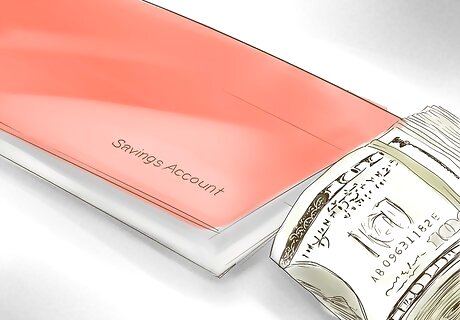
views
X
Research source
Finding a Consolidation Loan

Get a copy of your credit report. Your credit score determines what lending options will be available to you. If you've had multiple missed payments or are carrying high balances on credit cards, you might want to consider another option. You are entitled by law to a free copy of your credit report every year. Go to https://www.annualcreditreport.com/index.action. This is the only website authorized by the federal government to issue your free credit report. Taking out a consolidation loan can improve your credit score in the long run – if you use it wisely. For example, if you used the consolidation loan to pay off credit cards as well, don't immediately start racking up debt on those cards again.

Total your outstanding debt. The options available to you depend on how much money you owe, and how that compares to your income. If you only owe a few thousand dollars, you'll typically have more options. If your total debt is less than $3,000 and your credit is okay, you may be able to get a debt consolidation credit card. These cards typically offer no interest for the first 12 to 18 months. However, your payday loans may not qualify. Speak to a customer service representative at the credit card company to make sure. You may have additional debts other than your payday loans, such as outstanding credit card debt. Take a look at everything you owe and look at how much of it you want to consolidate.

Contact banks and credit unions. Banks and credit unions typically are the most likely to offer personal loans to consolidate debt. It's best to start with the bank where you have your checking or savings accounts, since you have a pre-existing relationship with them. You may be able to apply for a debt consolidation loan online. You still should talk to a representative and let them know your situation. You can give a real person a better picture of your situation than they could get by reading your loan application. If you're unable to get a loan from your regular bank, look at others nearby. Smaller, local banks tend to be more forgiving about poor credit than larger national banks.

Consider peer-to-peer lending. If you're unable to get a loan from a traditional bank or lending institution to consolidate your payday loans, peer-to-peer lending may offer a solution. These online services allow private individuals to lend money to other private individuals. The way these sites typically work, many individual lenders buy small interests in your total consolidation loan. You make a single monthly payment back to the site, which distributes the money to your lenders. Your credit score may still be a factor on these sites, but individual lenders typically are much more forgiving of troubling credit situations than your average traditional bank.

Compare rates and terms. Ideally, you'll have loan offers from more than one bank or credit card company. If you do, compare and contrast to find the loan product that will best meet your needs and save you the most money. If you have competing loan offers, don't be afraid to go back to a lender and ask for better terms. You can tell them the offer provided by the other lender and ask them to beat it or at least meet it. Remember, terms are not just the rate. Terms also include any fees, as well as what's in the fine print. Additionally, make sure that those things don't change if they agree to match an offer from another lender.

Create a monthly budget. If you decide to consolidate your payday loans by taking out another loan, that loan needs to become your priority. List your income and regular expenses to see where your money goes each month. Find areas where you can eliminate spending to free up more money to put towards paying off your loan. For example, you might make your coffee at home instead of stopping at a café on the way into work. You might want to talk to a financial advisor, especially if you feel you need help budgeting or organizing your finances properly.
Creating a Debt Management Plan

Find a credit counseling organization. If you've decided you want to use a debt management plan (DMP) to consolidate your payday loans and other debts, a nonprofit credit counseling agency can help. Check online to find an approved organization near you. You can find a list of agencies approved by the U.S. Trustee program for pre-bankruptcy counseling at https://www.justice.gov/ust/list-credit-counseling-agencies-approved-pursuant-11-usc-111. Even if you're not anticipating filing for bankruptcy, these agencies are a good place to start because they've been approved by the federal government. Most reputable credit counseling agencies are nonprofit and offer their services for free, or for very minimal fees. Steer clear of credit counseling agencies that want to charge you substantial fees or interest to create a DMP for you.

Read online reviews of the organization. Reviews from current or former clients of the organization can give you a good idea of what it's like to work with that organization and whether their methods are successful. Check the website of the Better Business Bureau and other neutral third-party organizations to get a wider variety of unbiased reviews. Keep in mind that if you're only reading reviews on the credit counseling organization's website, they may only be sharing the positive ones. You can also check local consumer protection offices or your state's attorney general to see if any complaints have been filed against the organization.

Meet with a credit counselor. You typically must complete a form giving the credit counseling agency you've chosen basic information about your situation. Based on that information, you'll be assigned a counselor to work with you personally. During your first meeting, the counselor will go over your income and expenses and verify your debt. You'll discuss budgets and the various options the agency may be able to offer you. Your counselor also will discuss any fees you'll be charged for participating in the various programs. You may have more than one meeting with your credit counselor before they arrive at a DMP that will work for you.

Complete an application. Once you've chosen the DMP you want to use, your credit counselor will require you to provide specific information about your finances, including your sources of income and all the debts you have. Your credit counselor will work with your lenders, including your payday lenders, to make payments on your loans. Once your application is approved, they will be contacting your lenders to get their cooperation with the plan. Expect it to take anywhere from a few days up to a week for your DMP to be finalized. You may be instructed not to contact your lenders or make any payments during this time. Follow your credit counselor's instructions.

Finalize and sign your agreement. Typically you'll have a final meeting with your credit counselor to go over the exact terms of your DMP. Once you sign the agreement, its terms will go into effect and you can start making payments to the credit counseling agency. From this point on, any communication from your lender should go through your credit counselor. If you're contacted by a lender who is included in your DMP, let them know that you are working with a credit counseling agency, and give them the name and contact information for your credit counselor.

Make your payments on time. Once your DMP begins, you'll be making a single payment, usually monthly, to your credit counseling agency. The agency will then distribute the money to your lenders according to your plan. You may be able to have your payments automatically withdrawn from your bank account. If this isn't an option for you, set reminders for yourself so you don't forget to make the payment by the due date. It can take months or even years to pay off your loans. In the meantime, if you make even one payment late, the credit counseling agency may consider this a breach of the agreement and withdraw its services.
Using a Debt Settlement Plan

Search for debt settlement companies. Some of the credit counseling agencies that offer debt management plans also may do settlement plans. There also are independent for-profit companies and law firms that offer debt settlement services. Read the reviews of any debt settlement company carefully, and check for complaints. Many of these are scam artists who prey on people who are in debt and desperate. Make sure you do your homework. Nonprofit credit counseling agencies that offer debt management plans as well as debt settlement plans may be your best option in the event you decide to go the settlement route. Because they are nonprofit, they typically will charge lower fees to administer the settlement plan.

Meet with a settlement advisor. Once you've chosen the debt settlement company or law firm that you want to manage your debt settlement plan, you'll be assigned a settlement advisor. At your initial meeting, your advisor will verify your debts and review your financial situation. Explain the nature of your outstanding payday loans, and make sure the company is willing to consider such short-term loans as part of a settlement plan. You typically will have to provide information about all your debts and the lenders, including contact information, so your settlement advisor can take over and start working on a settlement with them.

Evaluate the costs of settlement. Apart from any fees you have to pay to the credit counseling agency, a DMP won't cost you anything. However, when you enter into a debt settlement plan, you typically must pay the settlement company a percentage of the settlement. In addition to the amount you pay the settlement company, you may owe taxes on any portion of your debt that is written off by any of your lenders. While your settlement representative will go over these costs with you, it's also worth talking to an independent financial advisor and getting their opinion on whether a settlement plan is the best fit for your situation.

Start saving money. Typically you'll get better settlement terms if you're able to pay a large lump sum up front. Generally speaking, the larger the lump sum you can afford, the more generous the settlement terms. Your settlement advisor will work with you on a budget so you can free up money to put toward your settlement fund. You may have the option of paying this money directly to your settlement advisor, who will keep it in an escrow account until it's time to pay your lenders.

Negotiate with your original lenders. Your settlement advisor will work with your original lenders, including the holders of your payday loans, to reach a settlement on the debt. The terms of the settlement depend on a lot of factors, including how late you are on payments and how much money you owe. If your debts have already gone to collections, your settlement terms will be less favorable than if the debt stays with the original debtor. For this reason, don't wait until you've missed several months of payments before you start doing something to consolidate your payday loans. Your settlement advisor will explain the terms of each settlement offer, along with a breakdown of how much money you'll save and any tax implications of that savings. You may want to have your own attorney or financial advisor look over this as well.

Send money to your settlement advisor. Once your settlement plan is finalized, the settlement company or law firm typically pays your lenders off. You are then responsible for making monthly payments to your settlement advisor until you've paid them back. While a settlement plan may mean you end up paying less money than you would if you got a DMP or took out a consolidation loan, it may have a negative impact on your credit. All your accounts will now read "settled" rather than "paid in full," which can lower your credit score and will be a red flag to any new lenders you may seek out in the future, like for a mortgage or car loan.


















Comments
0 comment